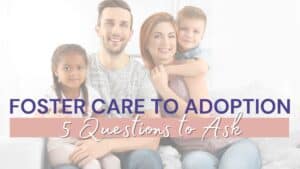
Foster Care to Adoption: 5 Questions to Consider
If you’re hoping to adopt a child, becoming a foster parent is often a great way to bring into your home a child who may,

Why children who have been adopted need to know their story — and how to tell it
Estimated reading time: 2 minutes
Kevin, a tall, handsome adolescent with a winning smile and matching personality, always looked forward to family Thanksgiving gatherings. It was a time when his home overflowed with people, noise and food for three days. This year was not going to be any different — or so he thought. However, by the end of Thanksgiving weekend, Kevin’s realization of who he is and the circumstances surrounding his adoption would be forever changed.
Kevin had always known he was adopted. When he was 18 months old, he had entered foster care because his mother had died from an undisclosed illness and his father, in distress, left Kevin with a neighbor and never came back. He was adopted by his foster parents a year later, the youngest of three children in the family.
Late Thanksgiving evening, Kevin and his cousin were playing Ping-Pong in the basement. He stood shell-shocked as his cousin told him the truth about his birth parents. Kevin’s mother did not die from an undisclosed illness. She died a drug addict and his father did not leave, at least not voluntarily; he was in prison.
Kevin was devastated by the words of his cousin and broken by what he felt was his parents’ betrayal, though he never mentioned it to them. Before long, he began to withdraw from them and become increasingly angry and sullen. His parents were dumbfounded. What was going on? Was it a problem with school? With friends? No, Kevin was angry because he was hurt knowing that his parents had kept important information from him. Why did they not tell him the truth about his birth parents?
So much damage can be done when the truth is concealed — even if it’s an attempt to protect someone’s feelings. This Handbook on Thriving as an Adoptive Parent “bonus” chapter explores sharing an adopted child’s story with him — the whole truth. We will examine the power of keeping secrets, why children need to know their story, five principles to follow in telling the story, a practical tool for telling the story, and God’s message about your child’s life story.